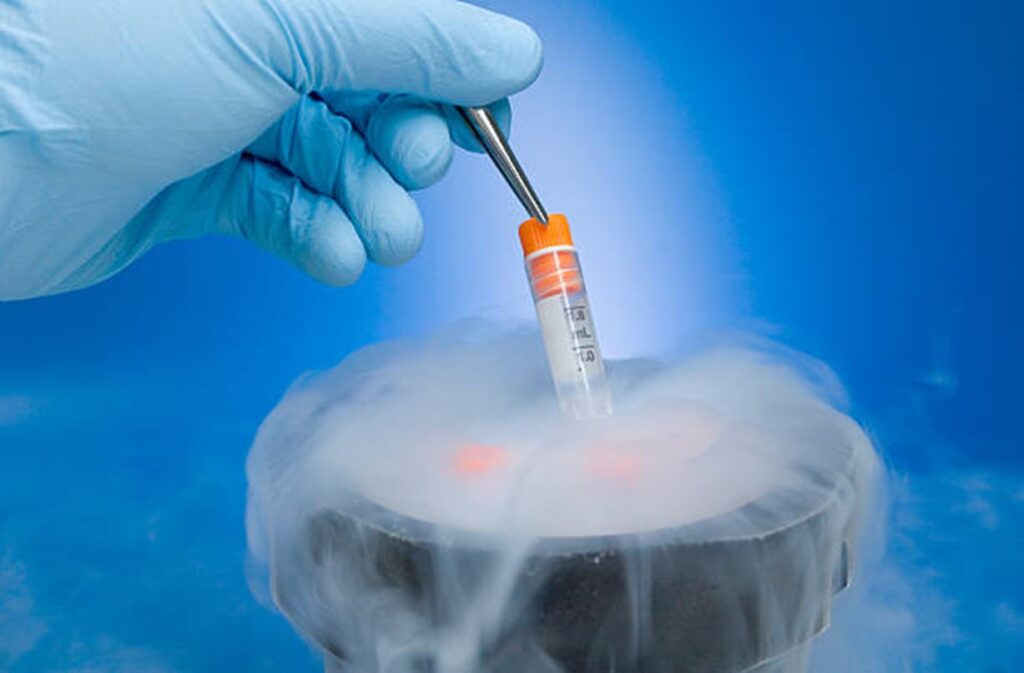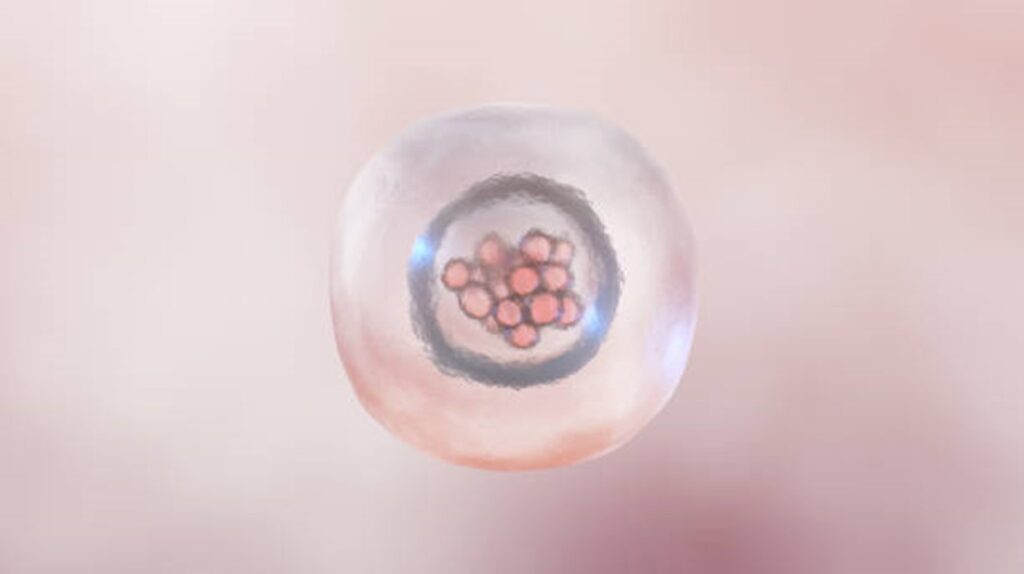Infertility, a global health concern, affects an estimated 10-15% of couples worldwide. Assisted reproductive technology (ART) is an advanced medical procedure. It offers a strategic approach to conception. Frozen Embryo Transfer (FET) is a crucial stage in ART.
“FET involves the transfer of previously frozen embryos into the uterus,” says Dr. Mohit Saraogi, one of the best IVF specialists in India and founder of Saraogi Hospital. “It is a method employed to optimize the chances of successful implantation. Sometimes, the pivotal moment of embryo implantation might occur later than anticipated.”
Dr. Mohit Saraogi is well-known for frozen embryo transfer treatment in Mumbai.
Let’s understand late implantation after FET.

Late implantation after frozen embryo transfer is when the embryo attaches late to the uterine lining. This phenomenon, while not uncommon, raises questions about:
- the factors influencing the timing of implantation
- its impact on the overall success of the fertility process
Dr. Mohit Saraogi’s expertise comes to the forefront in unraveling these intricacies. He specializes in providing personalized insights and guiding couples through this transformative journey.
Would you like to embark on your fertility journey with Dr. Mohit Saraogi? Please visit Saraogi Hospital, often recognized as the best IVF Centre in Mumbai.
Take the first step toward realizing your dreams of parenthood.
Ready to dive into the science behind delayed implantation? Let’s uncover the reasons behind late implantation after frozen embryo transfer.
Causes Of Late Implantation After Frozen Embryo Transfer

Let’s understand the factors contributing to late implantation after frozen embryo transfer.
- Embryo Quality: The quality of the embryo may influence late implantation to the uterine lining. Factors like genetic makeup can impact the timing of attachment.
- Uterine Receptivity: The embryo and the uterus must work together for successful attachment. Variations in the receptivity of the uterine lining can contribute to late implantation.
- Hormonal Factors: Hormonal imbalances, such as irregularities in progesterone levels, may affect the uterine environment. This can lead to delays in the implantation process.
- Age of the Woman: Fertility declines with age. Advanced maternal age can influence the timing of implantation after FET.
- Endometrial Thickness: Inadequate endometrial thickness may hinder the implantation process. This emphasizes the importance of a well-prepared uterine lining for successful embryo attachment.
Curious if there are any benefits to late implantation after frozen embryo transfer? Let’s look at the potential advantages.
Benefits Of Late Implantation:
This section will explore the intriguing possibilities of late implantation after FET. They include:
- Enhanced Embryo Selection: Late implantation may allow for a more stringent natural selection process. If only the best embryos attach, it can improve the overall success of the pregnancy.

- Increased Uterine Receptivity: Giving the uterine lining more time to prepare can enhance receptivity. It can foster an environment for a successful implantation. This will reduce the risk of implantation failure
- Optimized Endometrial Thickness: Late implantation may coincide with a more favorable endometrial thickness. This offers an ideal foundation for embryo attachment. It improves the chances of a healthy pregnancy.
- Balanced Hormonal Environment: Additional time before implantation allows for a more balanced hormonal environment. It helps support the crucial interplay between hormones necessary for successful embryo attachment.
- Reduced Risk of Multiple Pregnancies: Delayed implantation may contribute to a more controlled implantation process. It can lower the risk of multiple pregnancies and better manage potential complications.
“Individual experiences may vary,” says gynecological expert Dr. Saraogi. “The optimal timing for embryo implantation is a complex, individualized fertility aspect. It requires careful consideration and expert guidance.”
Do you wish to explore options of ART but are concerned about the IVF treatment cost in Mumbai? Seek guidance from a fertility specialist like Dr. Mohit Saraogi for cost-effective treatments.
Let’s uncover some practical tips that may improve your chances.
Tips To Improve Implantation After Frozen Embryo Transfer
Here are some tips to optimize your chances of a successful pregnancy.
Maintain a Healthy Lifestyle: Maintain your well-being and reproductive health by prioritizing:
- a balanced diet
- regular exercise
- adequate sleep

Minimize Stress: Stress management techniques can positively impact the reproductive process. They include:
- mindfulness
- relaxation exercises
- meditation
Follow Medication Protocols: Adhere to prescribed medications and treatment protocols diligently. This will help ensure optimal hormonal balance during the implantation phase.
Stay Hydrated: Adequate hydration supports a welcoming uterine environment. It helps enhance the conditions for successful embryo implantation.
Avoid Smoking and Excessive Alcohol: Cut or reduce smoking and excessive alcohol consumption. These habits can negatively impact fertility.
Are you seeking personalized insights and guidance on fertility matters? Please consult Dr. Mohit Saraogi, a respected IVF specialist in Mumbai.
Late implantation can be a perplexing aspect of the fertility journey. Let’s understand when you must seek medical advice!
Seeking Medical Advice For Late Implantation
Dr. Mohit Saraogi, a seasoned fertility expert, recommends seeking advice if:
No Pregnancy Despite Timely Attempts: Consistent attempts at conception have not resulted in pregnancy.
Irregular Menstrual Cycles: Irregular menstrual cycles or unusual changes in menstrual patterns.
Known Fertility Issues:
- Individuals with known fertility issues, such as:
- a history of miscarriages
- reproductive disorders
Age-related Concerns: Advanced maternal age can impact fertility. Women over 35 need to seek timely medical guidance if they suspect late implantation.
Multiple Unsuccessful IVF Attempts: Multiple In Vitro Fertilization (IVF) failures.
General Concerns: Any concerns or uncertainties about the timing of embryo implantation.
Remember, prompt medical intervention can:
- provide clarity
- identify potential issues
- pave the way for personalized solutions
- enhance the chances of a successful pregnancy
Conclusion

Late implantation after FET is a unique aspect of the fertility journey. Individuals embarking on this path encounter various considerations. They include understanding the benefits of seeking timely medical advice.
Are you addressing the causes, exploring benefits, or contemplating the optimal timing? Seeking professional guidance is paramount. Embrace the knowledge gained today. Take the proactive step toward achieving your dream of parenthood.
Schedule a consultation with Dr. Saraogi, a renowned fertility expert in Mumbai. Let your path to a successful pregnancy unfold with confidence. Dr. Saraogi can guide you with personalized insights and expert care.
Let’s dive into the frequently asked questions to unravel this crucial phase’s mysteries.
Frequently Asked Questions
1. What is the typical timeframe for embryo implantation after a FET?
Embryo implantation after a FET can vary between individuals. But, it typically occurs around 6 to 10 days.
2. How can I differentiate between late implantation and implantation failure?
Late implantation suggests a delayed but successful attachment. Implantation failure indicates the absence of successful attachment. Timely consultation with a fertility expert can provide clarity on individual circumstances.
3. Can late implantation lead to a successful pregnancy?
Yes, doctors have observed successful outcomes in cases of late implantation. Factors such as embryo quality, uterine receptivity, and hormonal balance play pivotal roles. Please consult fertility expert Dr. Mohit Saraogi for personalized insights and guidance.
4. How common is late implantation after frozen embryo transfer?
Late implantation can occur in a percentage of cases, varying among individuals. Factors such as embryo quality and uterine receptivity contribute to this variability.
5. Are there interventions to improve late implantation outcomes?
Yes, various interventions can optimize conditions for successful late implantation. They include:
- lifestyle adjustments
- medication protocols
- expert guidance
Consulting with a fertility specialist is critical for personalized recommendations.

